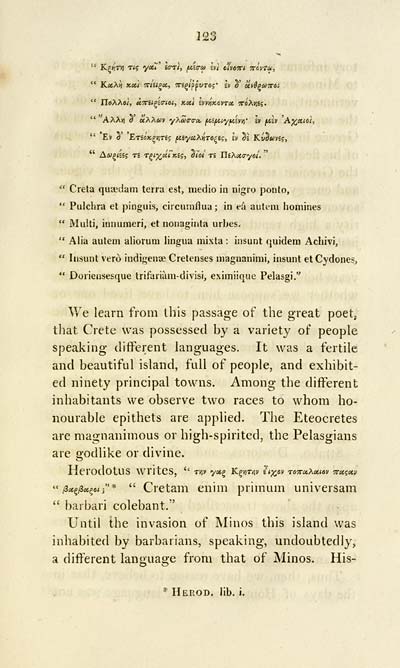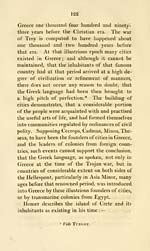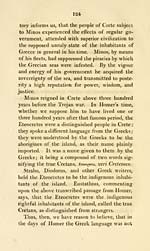Download files
Complete book:
Individual page:
Thumbnail gallery: Grid view | List view

V2i
" K^d't)) t<? yocT' Itrri, fAia-u m chovi t^ovtu,
" TUxXn xcti mu^oe., Tri^t^fVTo^' h S' avipwTra
" IIoAAo/, etTTil^Krioi, K»i lv]iyiX.ctTX ToMa-
"'AAA)) cixXm yXZa-tjx f^ifttyfcivyf h jWSv 'A^xioi,
" *Ev S' 'ET£o'x^*i«; ffEyofAd'To^E?, £v ?3 Kv'^uvsg,
" Au^iki ri r^iy^a,l'r.iq., 2ioi ri UiXctTyoL "
" Crela qusdam terra est, medio in nigro ponlo,
" Pulchra at pinguis, circumflua ; in eii auteni homines
" Multi, innuraeri, et noiiaginta urbes.
" Alia aulem aliorum lingua mixta : iiisunt quidem Achivi,
" hisunt vero indigense Cretenses magnanimi, insmit etCydone§,
" Doriensesque trifariam-divisi, eximiique Pelasgi."
We learn from this passage of the great poet,
that Crete was possessed by a variety of people
speaking different languages. It was a fertile
and beautiful island, full of people, and exhibit-
ed ninety principal towns. Among the different
inhabitants we observe two races to whom ho-
nourable epithets are applied. The Eteocretes
are magnanimous or high-spirited, the Pelasgians
are godlike or divine.
Herodotus writes, '' r^v y»^ Ke;f,rAv ii-^tit T07rcc>^x(ov Trccictp
" ^«g/3«^<w 3" * " Cretam enim primum universam
" barbari colebant."
Until the invasion of Minos this island was
inhabited by barbarians, speaking, undoubtedly,
a different language from that of Minos. His-
* Herod, lib. i.
" K^d't)) t<? yocT' Itrri, fAia-u m chovi t^ovtu,
" TUxXn xcti mu^oe., Tri^t^fVTo^' h S' avipwTra
" IIoAAo/, etTTil^Krioi, K»i lv]iyiX.ctTX ToMa-
"'AAA)) cixXm yXZa-tjx f^ifttyfcivyf h jWSv 'A^xioi,
" *Ev S' 'ET£o'x^*i«; ffEyofAd'To^E?, £v ?3 Kv'^uvsg,
" Au^iki ri r^iy^a,l'r.iq., 2ioi ri UiXctTyoL "
" Crela qusdam terra est, medio in nigro ponlo,
" Pulchra at pinguis, circumflua ; in eii auteni homines
" Multi, innuraeri, et noiiaginta urbes.
" Alia aulem aliorum lingua mixta : iiisunt quidem Achivi,
" hisunt vero indigense Cretenses magnanimi, insmit etCydone§,
" Doriensesque trifariam-divisi, eximiique Pelasgi."
We learn from this passage of the great poet,
that Crete was possessed by a variety of people
speaking different languages. It was a fertile
and beautiful island, full of people, and exhibit-
ed ninety principal towns. Among the different
inhabitants we observe two races to whom ho-
nourable epithets are applied. The Eteocretes
are magnanimous or high-spirited, the Pelasgians
are godlike or divine.
Herodotus writes, '' r^v y»^ Ke;f,rAv ii-^tit T07rcc>^x(ov Trccictp
" ^«g/3«^<w 3" * " Cretam enim primum universam
" barbari colebant."
Until the invasion of Minos this island was
inhabited by barbarians, speaking, undoubtedly,
a different language from that of Minos. His-
* Herod, lib. i.
Set display mode to: Large image | Transcription
Images and transcriptions on this page, including medium image downloads, may be used under the Creative Commons Attribution 4.0 International Licence unless otherwise stated. ![]()
| Early Gaelic Book Collections > Ossian Collection > Thoughts on the origin and descent of the Gael > (135) |
|---|
| Permanent URL | https://digital.nls.uk/82236064 |
|---|
| Description | Selected books from the Ossian Collection of 327 volumes, originally assembled by J. Norman Methven of Perth. Different editions and translations of James MacPherson's epic poem 'Ossian', some with a map of the 'Kingdom of Connor'. Also secondary material relating to Ossianic poetry and the Ossian controversy. |
|---|
| Description | Selected items from five 'Special and Named Printed Collections'. Includes books in Gaelic and other Celtic languages, works about the Gaels, their languages, literature, culture and history. |
|---|

